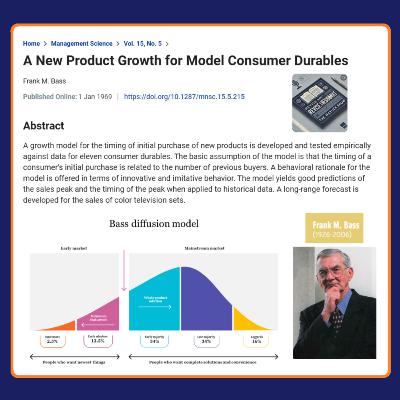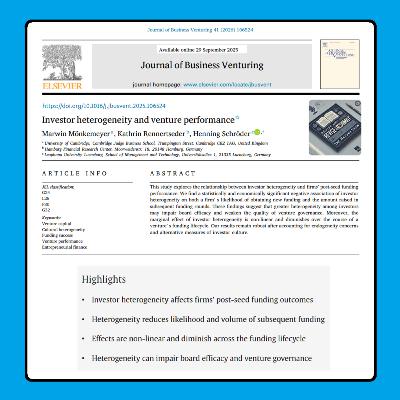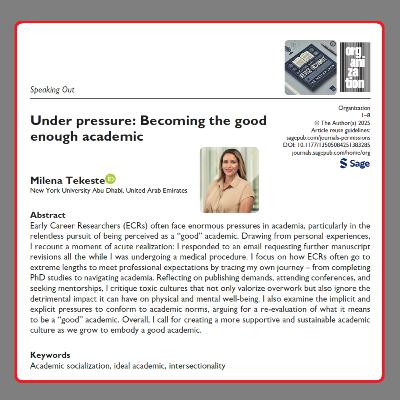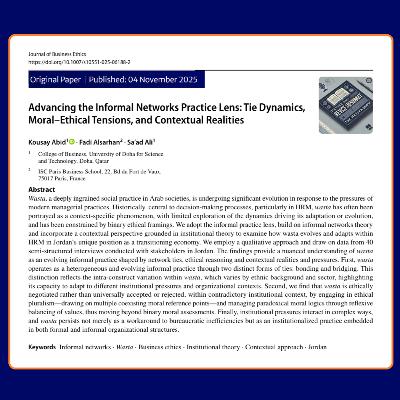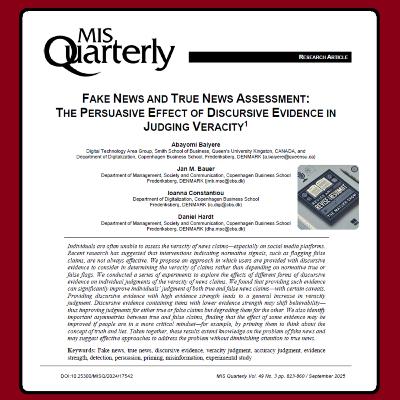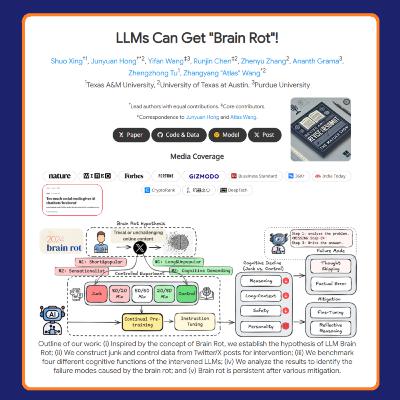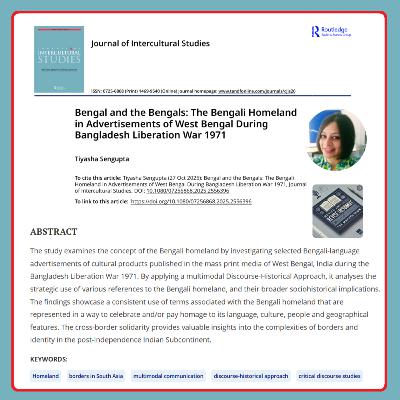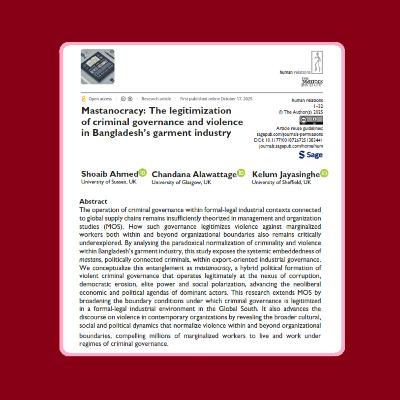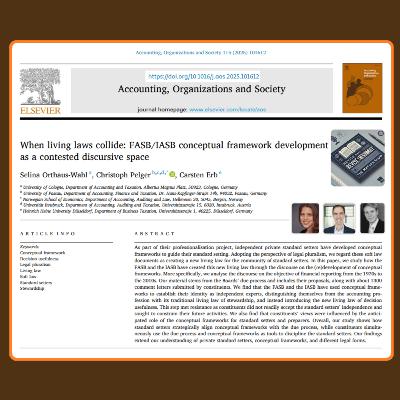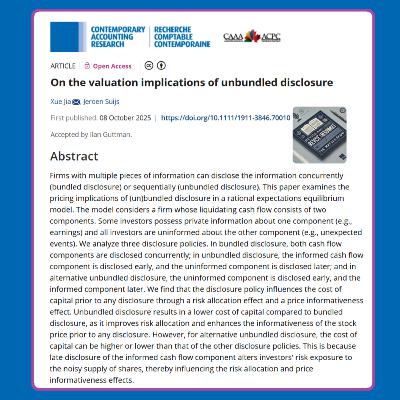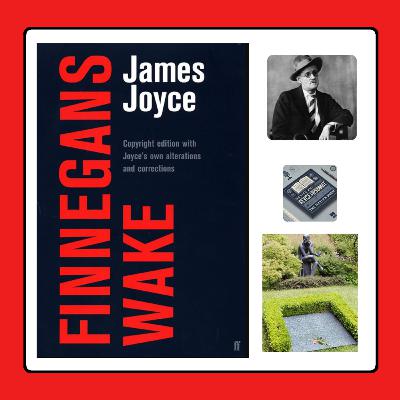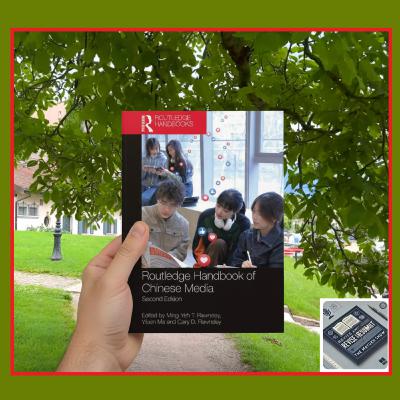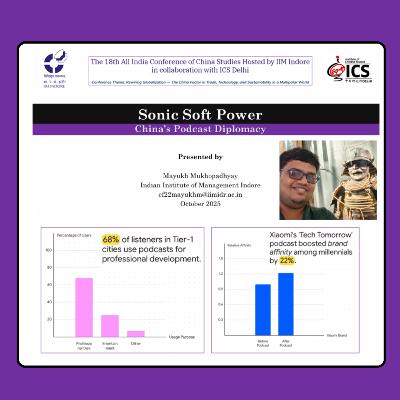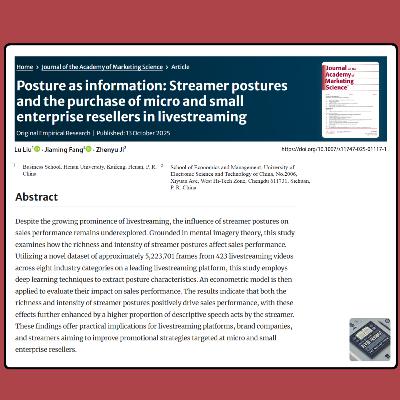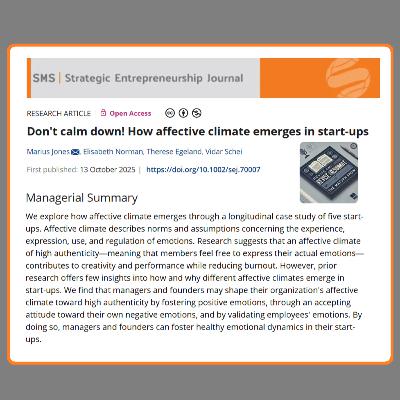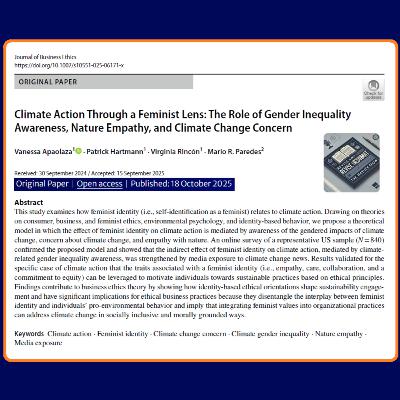Discover Revise and Resubmit - The Mayukh Show
Revise and Resubmit - The Mayukh Show

Revise and Resubmit - The Mayukh Show
Author: Mayukh Mukhopadhyay
Subscribed: 3Played: 40Subscribe
Share
© Mayukh Mukhopadhyay
Description
In Revise and Resubmit, a dynamic AI duo— Nikita and Pavlov — guides you through the fascinating world of academic research. Whether they’re debating emerging trends, revisiting theories, or exploring the latest innovations, their conversational style makes scholarly insights accessible and engaging for academics. Papers chosen by Mayukh. Powered by Google NotebookLM.
480 Episodes
Reverse
English Podcast Start at 00:00:00Bengali Podcast Start at 00:28:19Hindi Podcast Start at 00:49:25ReferenceFrank M. Bass, (1969) A New Product Growth for Model Consumer Durables. Management Science 15(5):215-227. https://doi.org/10.1287/mnsc.15.5.215Author Wiki: https://en.wikipedia.org/wiki/Frank_BassYoutube channel link https://www.youtube.com/@weekendresearcherConnect on linkedinhttps://www.linkedin.com/in/mayukhpsm/🎙️✨ Welcome back to Revise and Resubmit — your weekend escape into the brilliant, bizarre, and breathtaking world of academic ideas!🔥 Today’s episode is Weekend Classics, where we time-travel to 1969 — bell-bottoms, moon landings, and a model that would forever change how marketers, economists, and innovators understand product adoption.📈 From Management Science, we bring you Frank M. Bass’s legendary piece, “A New Product Growth for Model Consumer Durables.”This is where the Bass Model was born — that elegant curve mapping the dance between innovation and imitation, predicting how a product climbs, peaks, and fades in the hands of eager consumers.🛋️ Color TVs, microwaves, smartphones — Bass's insight still hums quietly behind every launch curve. But here’s the real kick: what if innovation itself could be forecasted just like weather? What happens when human curiosity becomes a mathematical rhythm?💭 So, is the future of every great idea already hiding in the curve of yesterday’s data?🙏 Big thanks to Frank M. Bass for his timeless contribution.🎧 Don’t forget to hit subscribe to Revise and Resubmit on Spotify, find us on our YouTube channel Weekend Researcher, and tune in across Amazon Prime and Apple Podcast. 📚💡
English Podcast starts at 00:00:00Bengali Podcast Starts at 00:35:11Hindi Podcast Starts at 01:03:49Polish Podcast Starts at 01:28:23ReferenceEnglish, C. (2025). The CIA Book Club: The Best-Kept Secret of the Cold War. HarperCollins UK. https://www.harperreach.com/products/the-cia-book-club-the-best-kept-secret-of-the-cold-war-charlie-english-9780008495121/Author Webpage: https://www.charlieenglish.net/bioYoutube channel link https://www.youtube.com/@weekendresearcherConnect on linkedinhttps://www.linkedin.com/in/mayukhpsm/🎙️ Hey book lovers and cold war curio-hunters! Welcome to "Revise and Resubmit," your one-stop shop for stories that sweep you off your feet. Today’s episode, "Weekend Book Review," is diving into the electrifying shadows of espionage and underground literature... so get ready for some true spy-versus-censor action. 📚🕵️♀️If you think spies only traded secrets, think again. In "The CIA Book Club: The Best-Kept Secret of the Cold War," Charlie English brings us a real-life tale where books became battle plans and printing presses ticked like quiet bombs of rebellion. This wasn’t just fiction—this was the front line. Imagine banned books like "1984" and "Animal Farm" spirited past watchtowers, floated across borders, concealed in luggage, and multiplied in secret print shops. Each book lighting a spark, a hidden rebellion, a clandestine reader’s hope.Let’s talk about the mastermind—Charlie English is London’s own wizard of narrative nonfiction. He’s led global news desks, illuminated lost libraries from Timbuktu to Europe, and written for everyone from The Guardian to the New York Times. Off the page, he’s even herding sheep in the English countryside with his border collie, Enzo, and still finds time to rescue literary history. You’d think wrestling sheep would be easier than wrangling Cold War secrets!As we tumble into this story of rebels and readers, you’ll meet Polish heroes like Miroslaw Chojecki, smuggling stories under martial law, and see how men and women with the courage to pass forbidden words helped tear down the iron walls of censorship. In the end, it wasn’t tanks that toppled regimes—it was the written word. That’s the power of a paperback in a world of propaganda.Huge thanks to Charlie English and William Collins—Harper Collins imprint—for giving us this wild, true story of how literature quite literally set people free.If you love a good yarn and the thrill of hidden history, make sure you hit subscribe. Tap that follow on Spotify, ring that bell on our YouTube channel "Weekend Researcher," and don’t forget—we’re also streaming on Amazon Prime Music and Apple Podcast. With so many ways to tune in, there’s no Iron Curtain between you and our next adventure.Now tell me—when was the last time a book changed your mind, or maybe even your life?
English Podcast Starts at 00:00:00Bengali Podcast Starts at 00:16:14Hindi Podcast Starts at 00:40:47German Podcast Starts at 01:01:45ReferenceMönkemeyer, M., Rennertseder, K., & Schröder, H. (2025). Investor heterogeneity and venture performance. Journal of Business Venturing, 41(1), 106524. https://doi.org/10.1016/j.jbusvent.2025.106524Youtube Channelhttps://www.youtube.com/@weekendresearcherConnect over linkedinhttps://www.linkedin.com/in/mayukhpsm/🎙️ Welcome to “Revise and Resubmit” — where ideas meet their second life, and every paper tells a story! 🌎✨Today’s episode ventures into the heartbeat of entrepreneurial finance — that fragile space between seed funding and the next big leap. 💡💸We’re diving into “Investor Heterogeneity and Venture Performance,” a 2026 article from the prestigious Journal of Business Venturing — yes, one of the elite FT50 journals that define academic excellence. 🏆Authored by Marwin Mönkemeyer, Kathrin Rennertseder, and Henning Schröder, and published by Elsevier, this study uncovers a paradox: when a startup’s investors come from diverse cultural backgrounds, the very diversity that promises innovation can, at times, sow discord. 🤔🌍Their data tells a sharp story — greater heterogeneity can mean lower chances of raising future funds and smaller investment volumes. The diversity dividend fades as ventures mature... suggesting that in early funding rounds, too many voices might just drown out direction. 📉🔍But here’s the twist Gary Provost would have loved — nothing in research is ever that simple. Every coefficient hides a conversation, and every finding sparks the question that keeps us revising and resubmitting.So here’s ours for today 🌀👇👉 When does diversity stop being a strength — and start becoming a cost in venture creation?Special thanks to the authors Marwin Mönkemeyer, Kathrin Rennertseder, and Henning Schröder, and to Elsevier for making this research possible through the Journal of Business Venturing (FT50). 🙏🎧 Don’t forget to subscribe to “Revise and Resubmit” on Spotify, and follow our Weekend Researcher channel on YouTube. You can also find us on Amazon Prime and Apple Podcasts — because good research should travel far and sound good everywhere. 🚀🎓
English Podcast Starts at 00:00:00Bengali Podcast Starts at 00:14:03Hindi Podcast Starts at 00:30:24German Podcast Starts at 00:49:24ReferenceTekeste, M. (2025). Under pressure: Becoming the good enough academic. Organization, 0(0). https://doi.org/10.1177/13505084251383285Youtube Channelhttps://www.youtube.com/@weekendresearcherConnect over linkedinhttps://www.linkedin.com/in/mayukhpsm/🎙️ Welcome to Revise and Resubmit — the podcast where ideas evolve, papers grow, and academics breathe between deadlines. 🌿Today, we open the doors to a story every Early Career Researcher will feel deep down in the pulse of their inbox. 📩 Imagine this — an email ping for yet another round of revisions... and you, halfway through a medical procedure, still typing “Thank you for your feedback.”This episode dives into “Under pressure: Becoming the good enough academic” — a powerful reflection by Milena Tekeste, published in Organization — a prestigious Scopus Q1 journal by SAGE Publications, released on October 22, 2025.Tekeste invites us into a quiet, brave space — one where being “good enough” challenges academia’s obsession with perfection. She writes not just with intellect but with pulse — tracing exhaustion, identity, and the strange pride of working through pain. 💭What does it truly mean to be a good academic… when being human already feels like the hardest part of the job? 🤔Thanks to Milena Tekeste and SAGE Publications for this candid, courageous work.🎧 Don’t forget to subscribe to Revise and Resubmit on Spotify, Amazon Prime, and Apple Podcast, and catch all our behind-the-desk reflections on the Weekend Researcher YouTube channel. 🌍Now… hit play, and let’s revise what it means to belong in academia.
English Podcast Starts at 00:00:00Bengali Podcast Starts at 00:16:21Hindi Podcast Starts at 00:38:45French Podcast Starts at 00:57:38ReferenceAbid, K., Alsarhan, F. & Ali, S. Advancing the Informal Networks Practice Lens: Tie Dynamics, Moral–Ethical Tensions, and Contextual Realities. J Bus Ethics (2025). https://doi.org/10.1007/s10551-025-06188-2Youtube Channelhttps://www.youtube.com/@weekendresearcherConnect over linkedinhttps://www.linkedin.com/in/mayukhpsm/🎙️ Welcome to “Revise and Resubmit” — the podcast where research meets rhythm, and ideas get a second, deeper look! 🌍📚Today, we set our compass toward the shifting sands of informal networks — and the quiet moral earthquakes beneath them. 🕊️Published on November 4, 2025, in the prestigious Journal of Business Ethics — yes, an FT50 powerhouse — comes a study that dares to rethink how influence, loyalty, and ethics collide in the world of Human Resource Management. ✨The article, “Advancing the Informal Networks Practice Lens: Tie Dynamics, Moral–Ethical Tensions, and Contextual Realities,” by Kousay Abid, Fadi Alsarhan, and Sa’ad Ali, dives deep into wasta — that fascinating web of personal ties running through Arab societies. 🌐Through 40 interviews in Jordan, the authors don’t just describe how wasta works — they explore why it endures, adapts, and even negotiates morality itself in a world obsessed with rules and performance metrics. ⚖️So here’s the real question...If informal ties like wasta evolve with time, ethics, and culture — can any organization ever truly escape them, or do we simply learn new ways to disguise them? 🤔Thanks to Kousay Abid, Fadi Alsarhan, and Sa’ad Ali, and to Springer Nature for publishing this thought-provoking piece in one of academia’s most admired journals. 🙌🎧 Don’t forget to subscribe to “Revise and Resubmit” on Spotify, follow our YouTube channel “Weekend Researcher”, and tune in through Amazon Prime or Apple Podcast — wherever you listen, research never sleeps! 🚀🎓
English Podcast Starts at 00:00:00Bengali Podcast Starts at 00:20:10Hindi Podcast Starts at 00:43:28Danish Podcast Starts at 01:03:47ReferenceAbayomi Baiyere, Jan M. Bauer, Ioanna Constantiou, Daniel Hardt; Fake News and True News Assessment: The Persuasive Effect of Discursive Evidence in Judging Veracity. MIS Quarterly 1 September 2025; 49 (3): 823–860. https://doi.org/10.25300/MISQ/2024/17542Youtube Channelhttps://www.youtube.com/@weekendresearcherConnect over linkedinhttps://www.linkedin.com/in/mayukhpsm/🎙️ Welcome back to Revise and Resubmit — the podcast where ideas get their second wind and research gets its rhythm! 🌊Today, we’re diving into the slippery world of truth and lies — into the noisy, neon-lit alleys of social media, where fake news and true news dance side by side, whispering to our biases.🧠 The paper we're unpacking? Fake News and True News Assessment: The Persuasive Effect of Discursive Evidence in Judging Veracity.Written by Abayomi Baiyere, Jan M. Bauer, Ioanna Constantiou, and Daniel Hardt — and published in MIS Quarterly (yes, that’s one of the elite FT50 journals!) on September 1, 2025, Volume 49, Issue 3.💡 Their research doesn’t just ask if people can spot falsehoods; it asks something sharper: can we teach people to reason through evidence—discursive evidence—rather than rely on those blunt “true” or “false” flags scattered across social media?🌐 Through their experiments, the authors reveal that evidence with real heft changes how people judge both true and false claims—almost like handing someone a new lens to see through the fog of misinformation. But sometimes that lens distorts, and that’s where it gets fascinating.So here’s the big question we’ll wrestle with today — 🕵️♀️When we learn to question news through reasoning instead of rules, do we become wiser… or simply more confident in our illusions?A huge thanks to Abayomi Baiyere, Jan M. Bauer, Ioanna Constantiou, and Daniel Hardt — and to the Association for Information Systems for publishing this work in such a prestigious FT50 journal. 🙌🎧 Don’t forget — subscribe to Revise and Resubmit on Spotify, follow our YouTube channel Weekend Researcher, and tune in through Amazon Prime or Apple Podcast. Let’s keep the conversation alive — one citation at a time! 💬📚✨
English Podcast Starts at 00:00:00Bengali Podcast Starts at 00:18:59Hindi Podcast Starts at 00:34:34Chinese (Simplified) Podcast Starts at 00:53:33ReferenceXing, S., Hong, J., Wang, Y., Chen, R., Zhang, Z., Grama, A., Tu, Z., & Wang, Z. (2025). LLMs Can Get “Brain Rot”! ArXiv.org. https://doi.org/10.48550/arXiv.2510.13928Paper Webpage https://llm-brain-rot.github.io/Fieldhouse, R. (2025). Too much social media gives AI chatbots “brain rot.” Nature. https://doi.org/10.1038/d41586-025-03542-2Youtube Channelhttps://www.youtube.com/@weekendresearcherConnect over linkedinhttps://www.linkedin.com/in/mayukhpsm/🎙️ Welcome to Revise and Resubmit, the place where serious science meets irresistible storytelling! 🌍✨Today, we’re diving into a brainy — and a little bit spooky — corner of artificial intelligence. 🧠💻 The preprint that’s stirring up the research world is titled LLMs Can Get "Brain Rot"!, penned by the powerhouse team of Shuo Xing, Junyuan Hong, Yifan Wang, Runjin Chen, Zhenyu Zhang, Ananth Grama, Zhengzhong Tu, and Zhangyang Wang. Published on arXiv on October 15, 2025, and already making waves with Nature’s coverage on October 31, this one’s not just rigorous… it’s revolutionary. 🌊📚The paper takes us somewhere few have dared to tread — into the slow cognitive decay of large language models exposed to junk web data. Imagine minds made of silicon, slowly unlearning how to think, reason, and reflect — all because of endless scrolls of memes, hot takes, and algorithmic noise. 📉😬These researchers didn’t stop at speculation — they ran controlled experiments, metrics, and causal isolations you can feel humming through every paragraph. This isn’t science fiction. This is science precision. 🧪🔍So today, we ask — if LLMs can lose their way by gorging on low-quality text… could our future AIs forget how to think clearly altogether? 🤔Big thanks to the authors and to the Cornell University Library for hosting this brilliant preprint on arXiv. 🙌 Also, a nod to Nature for spotting this one early and shining their journalistic light upon it. 🌟Before we dig into the details, don’t forget to subscribe to Revise and Resubmit on Spotify and on YouTube at Weekend Researcher — we’re also streaming on Amazon Prime and Apple Podcast 🎧📱💥
English Podcast starts at 00:00:00Bengali Podcast Starts at 00:16:48Hindi Podcast Starts at 00:40:17Chinese (Simplified) Podcast Starts at 01:03:34ReferenceKantha, A. (2025). Decoding China: Hard Perspectives from India Bloomsbury India. https://www.bloomsbury.com/in/decoding-china-9789361316739/Youtube channel link https://www.youtube.com/@weekendresearcherConnect on linkedinhttps://www.linkedin.com/in/mayukhpsm/🎙️ Welcome, everyone, to "Revise and Resubmit" — your go-to show for that irresistible mix of bookish curiosity and sharp, no-nonsense conversation. Today’s episode is the "Weekend Book Review," and we’re taking a deep dive into the dazzling, dramatic, and sometimes dangerous story of modern China. Welcome to the party, fellow readers! 🚀This week, we’ve got a book that's as wide as the Himalayas and as deep as the South China Sea. "Decoding China: Hard Perspectives from India," published just this August by Bloomsbury India, is not your usual weekend read. No, this one’s packed. It roars. It asks big questions, sometimes in short, sharp bursts, sometimes in winding, epic sentences that echo the sweep of history — the kind Gary Provost would craft and smile at. 📚✨Let’s talk about the editor, Ambassador Ashok Kantha, the steady hand behind this volume. He is a man who has spent nearly four decades in the thick of diplomacy, specializing in Asian affairs, three separate postings in China, and an advanced certificate in Chinese language for good measure. From New Delhi to Hong Kong, from Sri Lanka to the USA, Kantha has been there, has seen it, has shaped the dialogue. Who better to bring together insights from 21 of the sharpest minds — diplomats, military pros, scholars — all with ringside seats to China’s breathtaking rise?This book? It’s not just about China. It’s about India’s gaze. It’s about power and risk, about ambition and anxiety. It’s a symphony of essays — some short and punchy, some long and tempestuous — that track China’s big picture, global ambitions, domestic puzzles, and military dreams. Each section raises new questions. Each chapter splits open the headlines and lets the stories, and the stakes, tumble out. 🌏🔍So here’s where you come in. What does it really mean, for India, for the world, when two giants share a border and a destiny — but not always the same dreams? Why does China’s ‘rejuvenation’ keep diplomats, generals, and strategists up at night? And how do you even begin to decode a country that’s both ancient and radically new?Stick around. We’ll break it down. We’ll ask the questions no one else dares to ask. We’ll thank Ambassador Kantha and the folks at Bloomsbury India for giving us the map. And then — well, the rest is up to you.Don’t forget to hit that subscribe button on Spotify and our YouTube channel, Weekend Researcher! We’re also spinning on Amazon Prime Music and Apple Podcast. The story is far from over, and you won’t want to miss what’s next.So here’s the big question: If you had one burning question for China’s leaders or for India’s, what would you want answered first? 🔥🇮🇳🇨🇳Let’s get curious together — right here, on "Revise and Resubmit."
English Podcast Start at 00:00:00Bengali Podcast Start at 00:30:12Hindi Podcast Start at 00:47:28ReferencePandey, P. (2015). Pandeymonium. Penguin Books India. https://www.penguin.co.in/book/pandeymonium-2/Pandey, P. (2022). Open house. Penguin Books India. https://www.penguin.co.in/book/open-house-with-piyush-pandey/Puneet Jha. (2011, June 1). Baje sargam har taraf se goonj bankar des raag. YouTube. https://www.youtube.com/watch?v=MqYI0ijhk-8Prasar Bharati Archives. (2023, August 29). Mile Sur Mera Tumhara... | मिले सुर मेरा तुम्हारा... YouTube. https://www.youtube.com/watch?v=h_Vc4T2BdLUMishra, L. (2025, October 24). Advertising veteran Piyush Pandey passes away at 70. The Hindu. https://www.thehindu.com/news/national/advertising-world-doyen-piyush-pandey-passes-away/article70196749.eceYoutube channel link https://www.youtube.com/@weekendresearcherConnect on linkedinhttps://www.linkedin.com/in/mayukhpsm/Welcome to "Revise and Resubmit," the podcast where ideas evolve and stories resound. This is the episode, "Weekend Classics." Today, we gather in the quiet light of reflection to honor a giant of storytelling—Piyush Pandey. 🎙️✨Pandey was no ordinary man—born in Jaipur, a cricket-loving boy with a mind sharp enough to top his first year at St. Stephen’s College in history. It was his relentless travel on trains across India to play Ranji Trophy cricket that gifted him a panoramic view of life’s many faces. These journeys filled a treasure chest of human stories and emotions, all of which he carried into his work, forever changing advertising in India with warmth, humor, and authentic resonance.From the unforgettable Fevicol bus that held together more than just wood, to the musical unity of “Mile Sur Mera Tumhara” and the soul-stirring classical homage of “Desh Raag,” Pandey created more than ads—he crafted culture itself. His genius connected millions, transcending products to become part of India’s collective heart. 🧡📺On October 24, 2025, at precisely 5:50 a.m., he left us—his sister Ila Arun solemnly confirming the moment. Yet, his stories live on—in jingles, in memories, in the pulse of a nation.Today's journey is inspired by the brilliant memoir "Pandeymonium: Piyush Pandey on Advertising," published by Penguin Books India in 2015, where Pandey himself reveals the philosophy behind his vibrant life and career.Curious: What is it about the everyday that transforms into something extraordinary in the hands of a storyteller like Pandey? 🤔Thank you to Piyush Pandey for his enduring gifts.Subscribe to "Revise and Resubmit" on Spotify, the YouTube channel "Weekend Researcher," and find us on Amazon Prime and Apple Podcasts for more stories that shape our understanding. 🌟🎧
English Podcast Starts at 00:00:00Bengali Podcast Starts at 00:17:09Hindi Podcast Starts at 00:46:52ReferenceJelic, R., Yu, X., & Zhou, D. (2025). Private Equity Diversity and Talent: Do They Matter for Acquisitive Growth? Entrepreneurship Theory and Practice, 0(0). https://doi.org/10.1177/10422587251385536Youtube Channelhttps://www.youtube.com/@weekendresearcherConnect over linkedinhttps://www.linkedin.com/in/mayukhpsm/🎙️ Welcome to “Revise and Resubmit” — your weekly deep dive into the stories behind world-class research!Today, we turn our spotlight to a fascinating study that dives into the boardrooms of Private Equity firms—where deals are sealed, strategies unfold, and diversity just might be the secret ingredient to faster, smarter growth. 💼✨📚 The paper, "Private Equity Diversity and Talent: Do They Matter for Acquisitive Growth?", comes from the prestigious Entrepreneurship Theory and Practice, an FT50 journal revered for shaping the future of entrepreneurial scholarship.Authored by Ranko Jelic, Xinyu Yu, and Dan Zhou, and published online on October 22, 2025, by SAGE Publications, this research doesn’t just crunch numbers—it opens a window into how human capital, gender balance, and age diversity within Private Equity teams can accelerate their acquisition journeys. 🚀So, what makes a deal team truly powerful? Is it the brilliance of finance veterans—or the breath of fresh perspectives that diversity brings? 🤔🎧 Make sure to subscribe to “Revise and Resubmit” on Spotify, and don’t miss our video breakdowns on YouTube at Weekend Research. You can also catch us on Amazon Prime Music and Apple Podcasts—because good research deserves an audience everywhere! 🌍A huge thank you to Ranko Jelic, Xinyu Yu, and Dan Zhou, and to SAGE Publications, for sharing their insight through this remarkable piece of scholarship. 🙏✨
English Podcast Starts at 00:00:00Bengali Podcast Starts at 00:17:44Hindi Podcast Starts at 00:37:26Danish Podcast Starts at 01:00:50ReferenceSengupta, T. (2025). Bengal and the Bengals: The Bengali Homeland in Advertisements of West Bengal During Bangladesh Liberation War 1971. Journal of Intercultural Studies, 1–20. https://doi.org/10.1080/07256868.2025.2556396Wolff, B. (2020). Restoring the glory of Serampore. Colonial heritage, popular history and identity during rapid urban development in West Bengal. International Journal of Heritage Studies, 27(8), 777–791. https://doi.org/10.1080/13527258.2020.1824163Youtube Channelhttps://www.youtube.com/@weekendresearcherConnect over linkedinhttps://www.linkedin.com/in/mayukhpsm/🎧 Welcome to "Revise and Resubmit"! 🎤Step into the pages of history and let the story of Bengal sweep you away. Today, we journey to a time when headlines were alive with liberation and identity, where the ink of an ad could unite people across borders. This is no ordinary episode—this is a story composed with rhythm, color, and the restless beat of cultural memory.In this episode, we’ll unravel the research behind “Bengal and the Bengals: The Bengali Homeland in Advertisements of West Bengal During Bangladesh Liberation War 1971,” authored by Dr. Tiyasha Sengupta and published in the esteemed Journal of Intercultural Studies. Yes, that’s right—a Scopus Q1 journal, a beacon in the world of academic research! 🏆Published online by Taylor & Francis on October 27, 2025, this study opens a panoramic window to the past, where Bengali-language advertisements celebrated homeland, language, people, and geography, wrapping pain and pride together in every word. Using a multimodal Discourse-Historical Approach, Dr. Sengupta explores how these cultural products built bridges, not walls. What stories do these ads tell? How did a region torn by Partition reclaim solidarity through media?But here's what will keep you wondering: How does a border printed on a map hold back shared songs, or stop a memory passed from one generation to the next?🗺️📰Why does the idea of “homeland” pulse so powerfully, especially when the world seems to be busy drawing lines in the sand?🌟 Special thanks to Dr. Tiyasha Sengupta for this eye-opening work, and hats off to Taylor & Francis for bringing it to the world stage! 🌟Before you go—hit subscribe on "Revise and Resubmit" on Spotify, and check out "Weekend Researcher" on YouTube! We’re also streaming on Amazon Prime and Apple Podcast—wherever inspiration finds you! 🚀✨Now, let’s ask: How do you define your homeland? And could a simple advertisement change the way you see a boundary forever?
English Podcast Starts at 00:00:00Bengali Podcast Starts at 00:15:53Hindi Podcast Starts at 00:37:07ReferenceAhmed, S., Alawattage, C., & Jayasinghe, K. (2025). Mastanocracy: The legitimization of criminal governance and violence in Bangladesh’s garment industry. Human Relations, 0(0). https://doi.org/10.1177/00187267251383441Youtube Channelhttps://www.youtube.com/@weekendresearcherConnect over linkedinhttps://www.linkedin.com/in/mayukhpsm/🎙️ Welcome to Revise and Resubmit! 💡The podcast where we dive deep into the stories, struggles, and sparks behind the world’s most cutting-edge academic research — one paper at a time.Today, we’re unravelling a piece that hits like thunder ⚡ — “Mastanocracy: The legitimization of criminal governance and violence in Bangladesh’s garment industry”, by Shoaib Ahmed, Chandana Alawattage, and Kelum Jayasinghe. Published online on October 17, 2025, in the prestigious Human Relations — yes, that’s an FT50 Journal 🏛️ — and brought to you by SAGE Publications. 📚In this groundbreaking study, the authors escort us into the tangled alleys of Bangladesh’s garment industry — a place where power is stitched with fear, and violence is woven into the fabric of production. They show us how mastans — politically connected enforcers — shape an invisible empire of influence, discipline, and control. The paper doesn’t just ask who holds the power… it asks how that power becomes legitimate, even celebrated, in the name of progress. 🧵🔥And so, as we revisit this remarkable research, one thought lingers in the air —✨ When does governance cease to protect, and start to coerce? ✨A huge thank-you to the brilliant authors, Shoaib Ahmed, Chandana Alawattage, and Kelum Jayasinghe, and to SAGE Publications for making this vital work accessible through such a respected platform. 🙏🎧 Don’t forget to subscribe to Revise and Resubmit on Spotify, stream it on Amazon Prime and Apple Podcast, and check out our YouTube channel “Weekend Researcher” for behind-the-mic insights and bonus discussions. 🚀
English Podcast Starts at 00:00:00Bengali Podcast Starts at 00:14:49Hindi Podcast Starts at 00:43:47German Podcast Starts at 01:02:56ReferenceOrthaus-Wahl, S., Pelger, C., & Erb, C. (2025). When living laws collide: FASB/IASB conceptual framework development as a contested discursive space. Accounting, Organizations and Society, 115, 101612. https://doi.org/10.1016/j.aos.2025.101612Youtube Channelhttps://www.youtube.com/@weekendresearcherConnect over linkedinhttps://www.linkedin.com/in/mayukhpsm/🎙️✨ Welcome to “Revise and Resubmit”! This is where academic stories come alive, where the margins of scholarship whisper louder than the headlines, and where every citation hides a spark of rebellion.📚 Today, we dive into a conceptual battlefield — a story of law without lawmakers, rules rewritten in soft ink, and two mighty boards shaping the pulse of our financial language. The paper — “When Living Laws Collide: FASB/IASB Conceptual Framework Development as a Contested Discursive Space” — is authored by Selina Orthaus-Wahl, Christoph Pelger, and Carsten Erb, and published in the prestigious Accounting, Organizations and Society, an FT50 Journal from Elsevier. 🌟From the 1970s to the 2010s, they trace a tug-of-war between stewardship and decision usefulness, between tradition and independence. Through 1,300 comment letters — each, a small revolution in tone — standard setters tried to script their own “living law,” only to find that every rule they wrote was already being un-written by the very voices they invited to comment. 🌀It’s a tale of soft law, hard boundaries, and the quiet war of ideas that defines our accounting civilization. But here’s the real question that echoes beyond the journal page — when standard setters create a law for themselves, do they govern… or do they get governed? 🤔💭🎧 Thank you to the authors and to Elsevier for this remarkable contribution to our understanding of standard-setting discourse.📢 Don’t forget to subscribe to our podcast “Revise and Resubmit” on Spotify, and watch the extended analysis on our YouTube channel “Weekend Researcher.” You can also catch us on Amazon Prime Podcasts and Apple Podcasts — because every revision deserves a second listen. 🎧🔥
English Podcast Starts at 00:00:00Bengali Podcast Starts at 00:17:54Hindi Podcast Starts at 00:44:03ReferenceJia, X., & Suijs, J. (2025). On the valuation implications of unbundled disclosure. Contemporary Accounting Research, 1–30. https://doi.org/10.1111/1911-3846.70010Youtube Channelhttps://www.youtube.com/@weekendresearcherConnect over linkedinhttps://www.linkedin.com/in/mayukhpsm/🎤 Welcome, listeners, to Revise and Resubmit!📚 Today’s episode spotlights research at its sharpest edge. We’re stepping right into the FT50 spotlight, where the world’s most prestigious academic journals set the gold standard — and Contemporary Accounting Research stands tall among them.Our feature?✨ “On the valuation implications of unbundled disclosure” — written by the brilliant duo Xue Jia and Jeroen Suijs.Imagine a firm with two secrets: one whispered among insiders, the other hidden from every market eye. Should it reveal both at once? Or stretch the story, letting the market puzzle through clues one at a time? Jia and Suijs take us deep into this dance of information — bundled versus unbundled disclosure — and show us how it remakes the cost of capital, reshaping the very bones of risk and reward.By modeling the complex ballet between private knowledge and public surprises, their findings spark a revelation: Unbundled disclosure can lower the cost of capital by refining risk allocation and making prices wiser, sooner. But switch the sequence, and the story changes — uncertainty can rise, the crowd left guessing, prices flickering in the dark.Published online on 8 October 2025 by Wiley Periodicals LLC for the Canadian Academic Accounting Association, this paper proves why FT50 journals are where innovation comes alive.🌈 Don’t miss a beat — subscribe to Revise and Resubmit on Spotify, Amazon Prime, and Apple Podcast! Want more deep dives? Hit up our YouTube channel, Weekend Researcher, for premium content where research meets real curiosity.📝 Huge gratitude to Xue Jia and Jeroen Suijs — and to Wiley Periodicals LLC — for lighting up today’s discussion.🤔 But here’s the puzzle for the weekend: If unbundling makes prices more informative, what hidden risks might still sneak through when disclosure comes in pieces?
English Podcast Start at 00:00:00Bengali Podcast Start at 00:25:16Hindi Podcast Start at 00:39:37ReferenceJoyce, J. (1939). Finnegans wake. Faber and Faber. https://archive.org/details/in.ernet.dli.2015.463592/page/n3/mode/2upScott, Anna. This book club finally finished “Finnegans Wake.” It only took them 28 years. (2023, November 17). NPR. https://www.npr.org/2023/11/17/1213890392/this-book-club-finally-finished-finnegans-wake-it-only-took-them-28-yearsYoutube channel link https://www.youtube.com/@weekendresearcherConnect on linkedinhttps://www.linkedin.com/in/mayukhpsm/🎙️ Welcome to Revise and Resubmit!🌟 It’s our “Weekend Classics” episode — where words don’t just whisper ancient truths, they dance, twirl, and reimagine the limits of storytelling.Today, we tumble into a dream — half Dublin, half eternity — waking and laughing beside a river that never really ends. Our companion on this winding journey? None other than James Joyce, the Irish maverick who turned sentences into symphonies and everyday chatter into cosmic echo chambers.📖 Finnegans Wake — first unveiled to the world on May 4, 1939 by Faber and Faber — isn’t just a book. It’s an experiment in human thought, a wild linguistic carnival where time, myth, and memory blur into one. Within its shifting pages, an innkeeper sleeps, the cosmos stirs, and the whole history of mankind snoozes beside the Liffey.From the mischievous twins Shem and Shaun to the flowing spirit of Anna Livia herself, Joyce crafts a world where every sound means something — and maybe everything. His prose pushes us to lose ourselves, only to emerge awake — changed, if not entirely sure how.💫 James Joyce, born in Dublin in 1882, lived much of his life in self-exile but never left Ireland behind. With every sentence, he rewrote the rules of modern storytelling — bold, defiant, unapologetically original. From Dubliners to Ulysses, and finally Finnegans Wake, he proved that the novel could be not just read… but heard, felt, and decoded.✨ So before the next dream begins — smash that subscribe button to stay tuned with Revise and Resubmit on Spotify, Apple Podcast, and Amazon Prime. And if you want to see more deep dives like this, head to our YouTube channel Weekend Researcher — where literature meets late-night curiosity!📚 Big thanks to the brilliant author at the heart of today’s episode — the inimitable James Joyce — for reshaping how we think, read, and even breathe language.🤔 But tell me… if words have dreams, what do they wake into?
English Podcast starts at 00:00:00Bengali Podcast Starts at 00:14:10Hindi Podcast Starts at 00:37:02Chinese Podcast Starts at 00:52:12ReferenceRawnsley, M.-Y. T., Ma, Y., & Rawnsley, G. D. (2025). Routledge Handbook of Chinese Media. Routledge. https://www.routledge.com/Routledge-Handbook-of-Chinese-Media/Rawnsley-Ma-Rawnsley/p/book/9781032423715Youtube channel link https://www.youtube.com/@weekendresearcherConnect on linkedinhttps://www.linkedin.com/in/mayukhpsm/🎙️ Hey hey! Welcome back to Revise and Resubmit — your cozy corner for curious minds and caffeinated weekend thoughts. 💫 Today’s special episode of Weekend Book Review has me absolutely buzzing 📚 because we’re diving into a world that doesn’t just report stories… it creates them.Our spotlight this weekend? The Routledge Handbook of Chinese Media (2nd Edition) — published in August 2025 by none other than Routledge. This isn’t just a book; it’s a panoramic lens on how China’s media breathes, beats, and battles across the networks of the twenty-first century. 🌏 From Hong Kong’s street stories to Taiwan’s democratic voices to the digital ripples of TikTok and WeChat, this book connects the dots of power, protest, and pixels.And let’s talk about the minds behind it — the phenomenal trio Ming-Yeh T. Rawnsley, Yiben Ma, and Gary D. Rawnsley. 🧠 Their collective vision feels like a symphony of perspectives — scholarly yet soulful, analytical yet alive. Reading their work feels like stepping into a control room where every screen flickers with fragments of real, contemporary China.So grab your notebook, your tea, maybe even your curiosity hat, because by the end of this episode, you might just find yourself rethinking what “media” means in a world where every click shapes a nation’s narrative.Thank you to the editors and to Routledge for making such a bold and brilliant publication possible! 🌟Before we jump in, don’t forget to subscribe to Revise and Resubmit on Spotify and follow our YouTube home — Weekend Researcher. 🎧 We’re also live on Amazon Prime Music and Apple Podcast, so tune in wherever you love your weekend learning best.💭 Ready? Let’s turn the page and ask — when media becomes the mirror, whose reflection do we really see? 👀
Hindi Podcast Starts at 00:00:00Chinese (Simplified) Podcast Starts at 00:23:02English Podcast starts at 00:52:19Bengali Podcast starts at 01:10:11Book of Abstracthttps://iimidr.ac.in/wp-content/uploads/2025/10/BookOfAbstract.pdf#page=37https://icsin.org/ckfinder/userfiles/files/Book%20of%20Abstracts.pdf#page=38Programme Schedulehttps://icsin.org/ckfinder/userfiles/files/Programme%20Schedule.pdf18th AICCS, Flagship event of ICS, organized by IIM Indorehttps://iimidr.ac.in/research-publications/conferences/call-for-papers-the-18th-all-india-conference-on-china-studies-hosted-at-iim-indore-with-ics-delhi/Today we step into a world where voices do more than tell stories. They persuade. They brand. They cross borders without passports. Our journey begins with a single sound—China’s podcast diplomacy.In his paper Sonic Soft Power: China’s Podcast Diplomacy, presented at the 18th All India Conference of China Studies in October 2025, Mayukh Mukhopadhyay takes us behind the microphone. He shows us how, in a media landscape bound by regulation, podcasts become tools of entrepreneurship, storytelling, and soft power.He lays out how technology, platforms, and culture weave together to create a Chinese podcasting model that is not just about entertainment but about influence. About teaching and selling. About intimacy and control. About telling the world a story—and deciding who gets to listen, and how.But here is the question that lingers: when a podcast becomes a diplomat, who is really speaking—the storyteller, or the state?We thank the hosts and moderators of the 18th All India Conference of China Studies, organized by the Institute of Chinese Studies Delhi and IIM Indore.This episode is available on Amazon Prime and Apple Podcast. Subscribe now and keep listening.
English Podcast Starts at 00:00:00Bengali Podcast Starts at 00:14:21Hindi Podcast Starts at 00:34:25Chinese Podcast Starts at 00:58:22ReferenceLiu, L., Fang, J. & Ji, Z. Posture as information: Streamer postures and the purchase of micro and small enterprise resellers in livestreaming. J. of the Acad. Mark. Sci. (2025). https://doi.org/10.1007/s11747-025-01117-118th AICCS at IIM Indore (24-26 October 2025)https://icsin.org/activity/show/18th-all-india-conference-of-china-studies-aiccshttps://iimidr.ac.in/research-publications/conferences/call-for-papers-the-18th-all-india-conference-on-china-studies-hosted-at-iim-indore-with-ics-delhi/Youtube Channelhttps://www.youtube.com/@weekendresearcherConnect over linkedinhttps://www.linkedin.com/in/mayukhpsm/🎙️✨ Welcome to Revise and Resubmit!Today, we’re tuning in to a world where science meets screens, and posture becomes persuasion. 🎥💡From one of the most prestigious FT50 journals — the Journal of the Academy of Marketing Science — comes a study that quite literally changes the way we see selling.Our spotlight article is titled “Posture as Information: Streamer Postures and the Purchase of Micro and Small Enterprise Resellers in Livestreaming” — authored by Lu Liu, Jiaming Fang, and Zhenyu Ji, and published on October 13, 2025, by Springer Nature. 🌍📘💫 Picture this: a livestreamer sways forward, gestures wide, leans in closer — and suddenly, sales spike. This isn’t a coincidence; it’s communication in motion. The authors dive deep into over 5 million frames from 423 livestreams, using deep learning and econometric modeling to decode how movement creates meaning.They reveal something remarkable: it’s not just what a streamer says, but how they move that moves the market. Richer, more dynamic postures translate into higher energy, stronger mental imagery, and ultimately — more buying behavior. 💸🧠✨ And when these movements are synced with descriptive speech, the effect amplifies, shaping not just emotion, but decision.The implications stretch beyond screens — into every brand interaction, pitch, and performance. Livestreaming, it seems, isn’t just about selling a product; it’s about choreographing trust.📈 This is why the Journal of the Academy of Marketing Science, part of the elite FT50 list, stands as a beacon of excellence in marketing research — where data meets human nuance and theory comes alive.Before we wrap up, make sure you subscribe to Revise and Resubmit on Spotify, Amazon Prime, and Apple Podcast, and catch us in action on YouTube at Weekend Researcher — the home of insightful, engaging, and downright fascinating research storytelling! 🔥🎧🙏 Massive thanks to Lu Liu, Jiaming Fang, and Zhenyu Ji, and to Springer Nature, for showing us that even posture — when analyzed deeply — can reveal the future of digital commerce.🤔 But here’s a question to leave you thinking — if a posture can sell a product, could the next frontier of marketing be… body language decoded by AI? 💭📡
English Podcast Starts at 00:00:00Bengali Podcast Starts at 00:15:36Norwegian(Bokmål) Podcast Starts at 00:38:24ReferenceJones, M., Norman, E., Egeland, T., & Schei, V. (2025). Don't calm down! How affective climate emerges in start-ups. Strategic Entrepreneurship Journal, 1–39. https://doi.org/10.1002/sej.70007Youtube Channelhttps://www.youtube.com/@weekendresearcherConnect over linkedinhttps://www.linkedin.com/in/mayukhpsm/🎙️🔥 Welcome to Revise and Resubmit!Today, we’re turning the dial to full emotion — the electric heart of entrepreneurial life. ⚡ Startups don’t just grow from ideas or strategy; they grow from feeling. And that’s where today’s spotlight from an FT50 powerhouse journal, the Strategic Entrepreneurship Journal, comes in. 🚀Our featured paper — “Don’t calm down! How affective climate emerges in start-ups” — is a thrilling exploration by Marius Jones, Elisabeth Norman, Therese Egeland, and Vidar Schei, published on October 13, 2025, by John Wiley & Sons Ltd for the Strategic Management Society.😮 In the world of new ventures, emotions run wild — optimism ignites one day, anxiety shadows the next, and somewhere between those highs and lows... a culture begins to breathe. This study dives deep into that heartbeat, following five early-stage start-ups over twenty-two months to watch how affective climate — the shared emotional atmosphere — takes shape.The authors reveal that the most creative, high-performing start-ups don’t chase constant positivity or suppress tension. Instead, they cultivate authenticity — a climate where people can show up as they are, neither too calm nor too chaotic. Emotions here aren’t enemies; they’re signals, sparks, and sometimes, solutions. From constructive meta-emotions to interpersonal validation, this research shows that emotional honesty might just be the secret competitive advantage for founders navigating uncertainty.💡 And that’s why the Strategic Entrepreneurship Journal, one of the FT50 elite, stands out — bridging cutting-edge management theory with the raw, real pulse of human behavior in business.🎧 So before you ride the next emotional curve of your own creative journey, hit subscribe to Revise and Resubmit on Spotify, Amazon Prime, and Apple Podcast. And don’t miss our visual takes on the Weekend Researcher YouTube channel — where academic ideas meet entrepreneurial chaos with flair and fun. 🤓🚀🙏 Huge thanks to Marius Jones, Elisabeth Norman, Therese Egeland, and Vidar Schei, and to John Wiley & Sons Ltd, for giving us a reason to rethink emotion not as noise… but as the rhythm of innovation.🤔 Here’s our question for you — in a world obsessed with staying calm, could feeling deeply be the real superpower of successful founders? 💭🔥
English Podcast Starts at 00:00:00Bengali Podcast Starts at 00:13:39Spanish Podcast Starts at 00:41:01ReferenceApaolaza, V., Hartmann, P., Rincón, V. et al. Climate Action Through a Feminist Lens: The Role of Gender Inequality Awareness, Nature Empathy, and Climate Change Concern. J Bus Ethics (2025). https://doi.org/10.1007/s10551-025-06171-xYoutube Channelhttps://www.youtube.com/@weekendresearcherConnect over linkedinhttps://www.linkedin.com/in/mayukhpsm/🌿🎧 Welcome to Revise and Resubmit!Today’s episode of insight, empathy, and ethics comes straight from one of the world’s most prestigious FT50 journals — the Journal of Business Ethics. 🌍✨We’re diving into a groundbreaking study that stirs both the mind and the conscience — “Climate Action Through a Feminist Lens: The Role of Gender Inequality Awareness, Nature Empathy, and Climate Change Concern,” authored by Vanessa Apaolaza, Patrick Hartmann, Virginia Rincón, and Mario R. Paredes.🔥 Published online on October 18, 2025, by Springer Nature, this paper doesn’t just ask why we act on climate change — it asks who we become when we do.💪 It tells the story of how feminist identity — an identity built on care, collaboration, and equity — shapes the road to environmental action. The authors reveal that people who identify as feminists don’t just see climate change as a planet problem, but as a people problem. Their empathy with nature and awareness of gendered climate impacts transform concern into action — from small sustainable choices to powerful moral commitments.🪞 Imagine this: every time a feminist sees a flooded village, a burned forest, or a silent river, they don’t just see loss; they see inequality, and that realization turns into responsibility. Through theories of ethics, psychology, and identity, the study shows how who we are can shape what we save.📚 The authors remind us that true sustainability isn’t technical — it’s ethical, compassionate, inclusive. And that’s exactly what makes the Journal of Business Ethics shine as a pillar among the world’s FT50 journals — rigorous, visionary, and deeply human.💫 Before we close, don’t forget to subscribe to Revise and Resubmit on Spotify, Amazon Prime, and Apple Podcast, and join us visually on our YouTube channel, Weekend Researcher, where ideas spark, and research finds its voice.🙏 Heartfelt thanks to Vanessa Apaolaza, Patrick Hartmann, Virginia Rincón, and Mario R. Paredes, and to Springer Nature, for gifting us an inspiring look at the future of ethical climate action.🌈 But here’s the question to leave your mind wandering — if empathy can move mountains, could equality be the force that finally heals the Earth? 🌍💭


